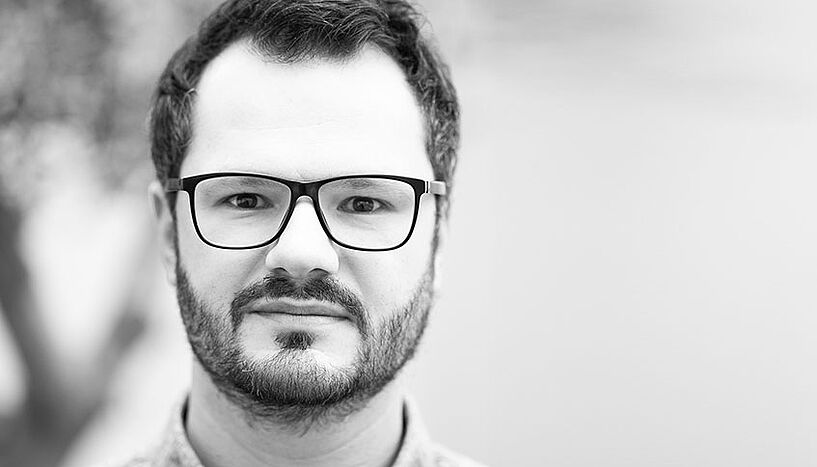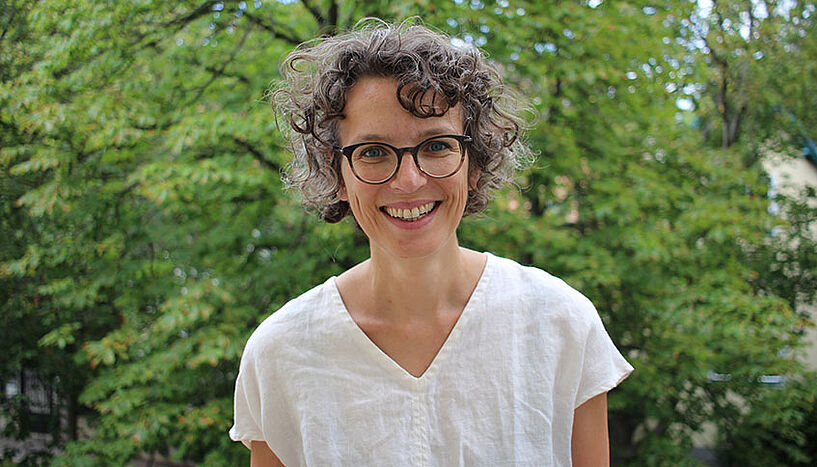
Professur für Sozialpsychologie im Kontext von Arbeit, Gesellschaft und Wirtschaft Fakultät für Psychologie
Lebenslauf: geboren 1983 in Torgau (Deutschland)
2002-2007 Studium der Psychologie und Interkulturellen Kommunikation an der Technischen Universität Chemnitz
2004-2005 Auslandsstudium und Forschungspraktikum (Prof. Dr. Wolfgang Stroebe) an der Universität Utrecht
2006-2007 Forschungspraktikum an der ETH Zürich, Zentrum für Organisations- und Arbeitswissenschaften (Prof. Dr. Theo Wehner) und an der Universität Freiburg, Professur für Sozialpsychologie und Methodenlehre (Prof. Dr. Karl Christoph Klauer)
2007-2010 Promotionsstipendium (Betreuer: Prof. Dr. Klaus Rothermund/Prof. Dr. Oliver Kirchkamp) und Mitglied im International Graduate College "Conflict and Cooperation between Social Groups" und in der International Max-Planck Research School "On Adapting Behavior in a Fundamentally Uncertain World"
2009-2010 Forschungsaufenthalte an der Hebräischen Universität Jerusalem, Center for the Study of Rationality and Interactive Decision Theory (Prof. Dr. Gary Bornstein) und an der Universität Kent in Canterbury, Centre for the Study of Group Processes
2010-2013 Postdocstipendium an der Universität Erfurt, Center for Empirical Research in Economics and Behavioral Sciences (Prof. Dr. Bettina Rockenbach)
2013-2019 Inhaber der Juniorprofessur für Decision Analysis an der RWTH Aachen, Fakultät für Wirtschaftswissenschaften
2018 Forschungsaufenthalte an der Universität Arizona, Eller College of Management (Prof. Dr. Tamar Kugler) und der Stanford Universität, Stanford Business School (Prof. Dr. Nir Halevy)
2019-2021 Inhaber der Professur für Angewandte Sozialpsychologie und Verhaltenswissenschaft an der Universität Kopenhagen, Department für Psychologie, Department für Ökonomie und Copenhagen Center for Social Data Science (SODAS)
seit September 2021 Professur für Sozialpsychologie im Kontext von Arbeit, Wirtschaft und Gesellschaft an der Fakultät für Psychologie, Universität Wien
Forschungsschwerpunkte:
* Urteilen und Entscheiden aus sozialpsychologischer und verhaltensökonomischer Perspektive
* Prosoziales Verhalten zu Überwindung globaler Herausforderungen, insbesondere Infektionskrankheiten, Intergruppenkonflikte und Klimakrise
"Ich interessiere mich dafür ob und unter welchen Bedingungen Menschen dazu bereit sind bei der Bewältigung globaler Herausforderungen nicht nur ihre eigenen Interessen, sondern auch prosozial die Interessen anderer Personen zu berücksichtigen. Als multidisziplinär arbeitender Verhaltenswissenschaftler beschreibe ich solche sozialen Entscheidungskonflikte mithilfe spieltheoretischer Modelle und teste Verhaltensinterventionen mit Labor-, Online- und Feldexperimenten. Die Forschungsergebnisse helfen Prädiktoren von und individuelle Unterschiede in prosozialem Verhalten zu verstehen. Weiterhin berate ich politischen Entscheidungsträger*innen darin wie Prosozialität zur Bewältigung sozialer Herausforderungen gefördert werden kann (z.B. Verhaltenseinschränkungen und Impfbereitschaft zur Einschränkung der Bedrohung durch Viruserkrankungen)". (Robert Böhm)

Professur für Betriebswirtschaftslehre – Marketing an der Fakultät für Wirtschaftswissenschaften
Curriculum Vitae:
2004-2008 PhD, Faculty of Business, Economics, and Statistics, University of Vienna, Austria
2008-2010 Assistant Professor, Aarhus School of Business, Aarhus University, Denmark
2010-2013 Assistant Professor, Marketing Management, Rotterdam School of Management, Erasmus University Rotterdam, The Netherlands
2013-2014 Associate Professor (tenured), Rotterdam School of Management, Erasmus University Rotterdam, The Netherlands
2015- Guest Professor, Rotterdam School of Management, Erasmus University Rotterdam, The Netherlands 2015 -2021 Professor, Chair of Marketing, TUM School of Management, Technical University of Munich, Germany
since September 2021 Professor of Marketing at the
Department of Marketing and International Business, University of Vienna
Research Areas: * Personalization
* The Value of Transparency
* New Product Development
* Psychology of Artificial intelligence
* Value of Human Labor
* Creativity
"My research is situated at the interface of marketing, technology, and human behavior. I am particularly interested in studying how technological changes affect the behavior of firms, consumers, and society in general. My research is empirical in nature and relies primarily on experimental data but also on correlational data." (Christoph Fuchs)

Professur für Moralphilosophie und Politische Philosophie an der Fakultät für Philosophie und Bildungswissenschaft
Curriculum Vitae:2003-2007 MPhysPhil in Physics and Philosophy with First Class Honours, Balliol College, University of Oxford Appointments
2003-2007 Scholarship, Studienstiftung des Deutschen Volkes
2007 Elizabeth Anscombe Prize, University of Oxford
2007 Gibbs Prize, University of Oxford
2007- 2008 Presidential Scholarship, Massachusetts Institute of Technology
2007-2012 PhD in Philosophy, Department of Philosophy and Linguistics, Massachusetts Institute of Technology
2012-2015 Lecturer, Faculty of Philosophy, University of Cambridge
2012-2021 Fellow, Sidney Sussex College
2015-2021 Senior Lecturer, Faculty of Philosophy, University of Cambridge
2016 CRASSH Early Career Fellowship
2019-2021 Leverhulme Research Fellowship
since September 2021 Professor of Moral and Political Philosophy, Faculty of Philosophy and Education, University of Vienna
Research Areas:* Moral psychology (moral responsibility)
* Moral epistemology (moral testimony, moral expertise, moral understanding)
* Feminist philosophy (invisible labour): I’m currently thinking about how we gain moral knowledge, what excuses are and what they tell us about the nature of moral responsibility, and about work: What is seen as "work", how work gets counted, and how this contributes to gendered inequalities.
"My research seeks to understand the practices that lie at the center of our moral lives: how we give and receive moral advice, how we blame, forgive, make excuses, how we praise and give credit. Such understanding is valuable for its own sake but it can also point us towards ways in which those practices may contribute to unjust social arrangements and should be reformed." (Paulina Sliwa)




